(from the February 2005 issue of American Theatre magazine, published by Theater Communications Group)
BY CHRISTOPHER DURANG
CHRISTOPHER DURANG: You primarily write stylized and nonrealistic comedies.
NOAH HAIDLE: I don't try to write comedy per se. The more I try to write comedy, the worse it is. But I think I'm definitely drawn to "nonrealistic." I don't want to see any representation or mimesis of reality on stage. That's just outdated and can be done so much better in film and TV. Part of the enjoyment of watching Mr. Marmalade is watching a twentysomething actor play a four-year-old and walk around in a tutu. Your imagination has to work harder as an audience member than it would watching film or TV. I take the play on two levels: One, it's this alternative universe where children at age four attempt suicide, and, more significantly, have imaginary friends who are not very nice. At the same time, these child characters learn this imagined world from the real world that surrounds them. The conceit that this four-year-old has an imaginary friend who ends up acting like an abusive husband is very funny, I think.
CD: How did audiences respond to it?
NH: Well, there were some funny letters to editors. One letter said, "We're canceling our subscription to South Coast Repertory. It's become a red-light porno-district theatre." But, is it funny, especially when he starts doing cocaine and hitting her and having porno? I mean, it's a little bit of both, and it's pretty awful to watch. It seemed to be the natural progression of the character. Again, it's imaginary. She's a 26-year-old actress. It's amazing—people would come up to the actress afterwards and be like, "Are you okay?" I thought that part of the success of the play was that they really lost the sense that she was an actress. I like it when comedy and/or oddness can be married with real emotion. Was working that way a conscious choice, or just something that happened as you got older? I think it was something that I always tried to do, even back in undergrad days, but not as successfully. In spite of very strange circumstances, if the characters aren't grounded in emotional reality, then who cares? What's the point?
CD: The first time I met you, you were the only sophomore in a class I taught at Princeton. Had you been writing for long before that?
NH: No, not really. I grew up in Michigan with no connection to the theatre at all. I think I saw my first play when I was 17 or 18... Our Town... I loved it. I think it's the best play ever. I love Our Town, too.
CD: You actually asked me to write you a recommendation, but I never did. That was terrible of me.
NH: Maybe that was how I got into Juilliard. You felt guilty.
CD: If you weren't always going to be a playwright, did you have other thoughts about what you wanted to do?
NH: I wanted to be a physicist very much, but I realized, to my heartbreak, that I really wasn't very good at math. Then, all of a sudden, I decided that I was going to be a playwright. I said to myself, "Okay, I have no access to theatre. I know no one who does this professionally. So how can I do this?" So I read plays. I was kind of a dork about it. I would read plays and take notes and read them again and take notes about what to do. I don't read novels very often. Thornton Wilder was obsessed about novels versus plays -- about the hand of narration. In novels, there's someone telling you what happened. Theatre at its best really is about what is happening. That seems so much more satisfying to me. I find that my most satisfying theatrical experiences are on the page. Reading.
CD: On to another topic, I know you write on a typewriter—why is that?
NH: It sounds like an affectation to write on a typewriter now, but for some reason I really like it -- I like the feel of the paper when it's done, because it feels like Braille on the back. It feels like you've done something with your day. I like how hard it is to actually strike the keys. I like the look of it very much. I like the weight of the paper after you're done. And I don't trust computers. The distance between me and the font -- it looks like anybody's writing. I don't like it. I remember at Princeton you'd see manuscripts by Joyce Carol Oates or whoever just sitting around on regular computer paper. And all of a sudden it wasn't as neat.
CD: This play has very funny scene headings. In production are they indeed used, and how?
NH: Well, I was reading Don Quixote at the time and it's literally like a page telling you what is going to happen: "Of Don Quixote and his servant and the adventures..." and they just go on and on. This being my first produced play, I really didn't know how they would function. I just wrote them because I was amused. They ended up being done as titles. We had a curtain that came down between each scene and they would come on line by line. They timed it—really to an eighth of a second— when the next one would come on. They really helped out with the pace of the play. People would laugh at them. I remember at an audience talkback a guy said, "I thought those titles were very good. How did you write them like a four-year-old would write?" And I was like, really? I tried to write them as a 25-year-old would write them.
Subscribe to:
Post Comments (Atom)
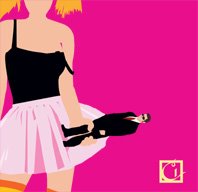
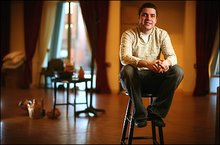

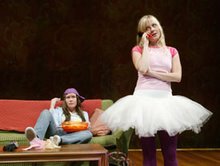
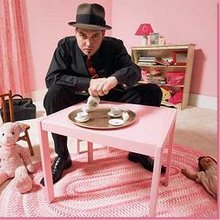

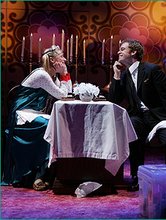
No comments:
Post a Comment